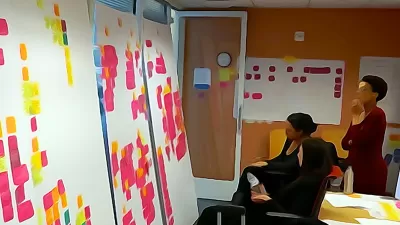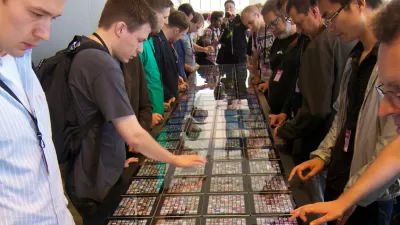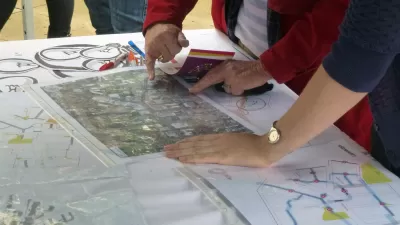A new generative tool developed by Sidewalk Labs uses machine learning and computational design to generate millions of comprehensive planning scenarios.
Violet Whitney shares news of a new generative design tool developed by the team at Sidewalk Labs, including the demo video shared above.
Whitney describes the need for the project as follows:
Today, the various experts on a planning team often run separate analyses to produce a neighborhood design: an architect uses one type of software to simulate sunlight, an engineer uses another to plan streets, a real estate developer models economics in a spreadsheet, and so on. The time and cost needed to coordinate all these competing elements often means a project can only afford to develop a handful of designs for the project team, with limited insight into how these options will impact the community.
The new tool does two things previously unavailable among design software options:
First, using machine learning and computational design, it can help planners generate not just one or two but millions of comprehensive planning scenarios. Second, it can help evaluate all kinds of impacts these different scenarios could have on key quality-of-life measures, producing a set of options that best reflects a community’s priorities.
The article includes a case study, set in a two-block urban area—to show how the new generative tool works. The post also imagines that this kind of generative design tool could eventually become a powerful tool of community engagement.
FULL STORY: A first step toward the future of neighborhood design

Alabama: Trump Terminates Settlements for Black Communities Harmed By Raw Sewage
Trump deemed the landmark civil rights agreement “illegal DEI and environmental justice policy.”

Study: Maui’s Plan to Convert Vacation Rentals to Long-Term Housing Could Cause Nearly $1 Billion Economic Loss
The plan would reduce visitor accommodation by 25% resulting in 1,900 jobs lost.

Planetizen Federal Action Tracker
A weekly monitor of how Trump’s orders and actions are impacting planners and planning in America.

Study Links Covid and Poor Driving
The effects of the virus, including ‘brain fog,’ can make driving more difficult and dangerous.

Waymo Gets Permission to Map SF’s Market Street
If allowed to operate on the traffic-restricted street, Waymo’s autonomous taxis would have a leg up over ride-hailing competitors — and counter the city’s efforts to grow bike and pedestrian on the thoroughfare.

Parklet Symposium Highlights the Success of Shared Spaces
Parklets got a boost during the Covid-19 pandemic, when the concept was translated to outdoor dining programs that offered restaurants a lifeline during the shutdown.
Urban Design for Planners 1: Software Tools
This six-course series explores essential urban design concepts using open source software and equips planners with the tools they need to participate fully in the urban design process.
Planning for Universal Design
Learn the tools for implementing Universal Design in planning regulations.
Caltrans
Smith Gee Studio
Institute for Housing and Urban Development Studies (IHS)
City of Grandview
Harvard GSD Executive Education
Toledo-Lucas County Plan Commissions
Salt Lake City
NYU Wagner Graduate School of Public Service





























